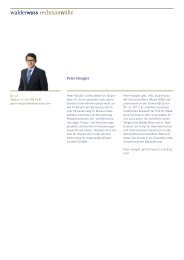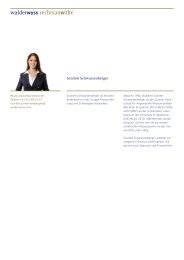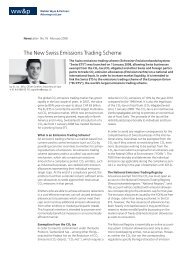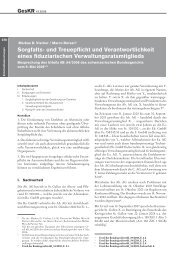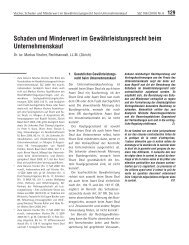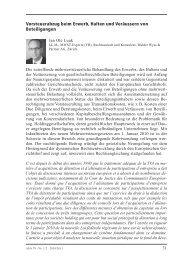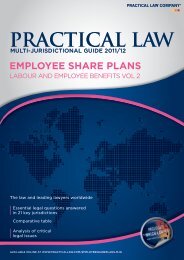Competition Litigation 2010 - Walder Wyss Ltd.
Competition Litigation 2010 - Walder Wyss Ltd.
Competition Litigation 2010 - Walder Wyss Ltd.
You also want an ePaper? Increase the reach of your titles
YUMPU automatically turns print PDFs into web optimized ePapers that Google loves.
Chapter 33<br />
Switzerland<br />
Reto Jacobs<br />
<strong>Walder</strong> <strong>Wyss</strong> & Partners <strong>Ltd</strong>.<br />
Gion Giger<br />
1 General<br />
out above, the majority of the procedural rules are still laid down in<br />
Cantonal law.<br />
178<br />
1.1 Please identify the scope of claims that may be brought in<br />
Switzerland for breach of competition law.<br />
Under the Swiss Federal Act on Cartels and Other Restraints of<br />
<strong>Competition</strong> (LCart), civil competition actions can be brought<br />
before Swiss civil courts by enterprises which are impeded by an<br />
unlawful restraint of competition. Such unlawful restraint of<br />
competition may consist either:<br />
in unlawful horizontal or vertical agreements that<br />
significantly affect competition without being justified by<br />
economic efficiency or that lead to the suppression of<br />
effective competition (article 5 LCart); or<br />
in an abuse of a dominant position (article 7 LCart).<br />
The action is aimed at the enterprise restraining competition. In<br />
case of unlawful agreements, the adverse party is one or several<br />
enterprises involved in such unlawful agreements; in case of abuse<br />
of a dominant position, the adverse party is the enterprise having a<br />
dominant position in the market. It is not mandatory to sue several<br />
parties liable for the restraint together as these have joint and<br />
several liability.<br />
1.2 What is the legal basis for bringing an action for breach of<br />
competition law?<br />
Civil competition actions for breach of the LCart are based on<br />
article 5 LCart (unlawful agreements) or on article 7 LCart (abuse<br />
of a dominant position).<br />
Articles 12 to 17 LCart provide some special procedural rules for<br />
civil proceedings. For the majority of the procedural rules the 26<br />
Cantonal codes of civil procedure apply. However, a federal code<br />
of civil procedure will replace these 26 Cantonal codes. Articles 14<br />
(jurisdiction), 16 (protection of business secrets) and 17 LCart<br />
(interim remedies) will also be substituted for similar provisions. It<br />
is expected to come into force on 1 January 2011. For a pending<br />
civil action, the relevant Cantonal code will remain applicable for<br />
the procedures at the instance the action will already have reached,<br />
but not for procedures before any further instances. The following<br />
explanations focus on the present law, as it will still be applicable<br />
in <strong>2010</strong> (with some remarks whether the law will change in 2011).<br />
1.3 Is the legal basis for competition law claims derived from<br />
international, national or regional law?<br />
The main legal basis is Swiss federal law. However, as already set<br />
1.4 Are there specialist courts in Switzerland to which<br />
competition law cases are assigned?<br />
Civil competition actions are assigned to the normal civil courts and<br />
commercial courts respectively (if any). As every Swiss Canton is<br />
competent to establish its courts, the court before which civil<br />
competition actions have to be brought is assigned by Cantonal law.<br />
However, federal law requires that there is only one single court in<br />
each Canton which handles competition cases. Usually, the<br />
Cantonal rules assign civil competition actions to a higher Cantonal<br />
court.<br />
Some Cantons (Zurich, Berne, Aargau, St. Gallen) have established<br />
special courts for commercial matters whose judges have special<br />
knowledge with respect to commercial matters. These commercial<br />
courts are also the competent courts for civil competition actions.<br />
However, they are not specialised in competition law cases only, but<br />
more generally in commercial matters, including e.g. intellectual<br />
property.<br />
The new federal code of civil procedure will not change these rules<br />
of jurisdiction. It will be for the Cantons to decide whether to<br />
assign competition law cases to courts for commercial matters. But<br />
still, there will not be any courts exclusively dealing with<br />
competition law cases.<br />
1.5 Who has standing to bring an action for breach of<br />
competition law and what are the available mechanisms<br />
for multiple claimants? For instance, is there a possibility<br />
of collective claims, class actions, actions by<br />
representative bodies or any other form of public interest<br />
litigation?<br />
In order to have standing for a claim, it suffices for the claimant to<br />
be affected by the restraint of competition. It is neither necessary<br />
for the claimant to be a competitor nor does the restraint have to be<br />
directly aimed at the claimant. However, according to the<br />
prevailing doctrine, consumers are not authorised to bring claims<br />
based on the LCart.<br />
Collective actions or actions brought by associations do not exist in<br />
Swiss competition law. Class actions are completely unknown in<br />
Swiss law. In connection with the preliminary work for the new<br />
federal code of civil procedure, the introduction of class actions was<br />
discussed but rejected.<br />
However, it is possible that several claimants form a simple dispute<br />
association (einfache Streitgenossenschaft). Furthermore, there is<br />
WWW.ICLG.CO.UK<br />
ICLG TO: COMPETITION LITIGATION <strong>2010</strong><br />
© Published and reproduced with kind permission by Global Legal Group <strong>Ltd</strong>, London





